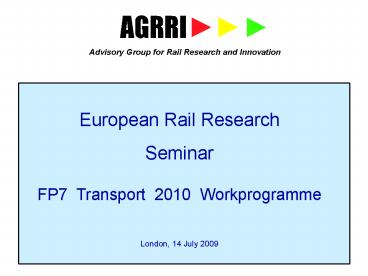European Rail Research - PowerPoint PPT Presentation
1 / 14
Title: European Rail Research
1
Advisory Group for Rail Research and Innovation
European Rail Research Seminar FP7 Transport
2010 Workprogramme London, 14 July 2009
2
Context
- Europe a key theme of Railway Industry
Research Strategy - FP7 (2007-2013) EUs main RD funding
programme - Objective support EU competitiveness
development of its common policies - Budget 50.5 billion
- FP7 Transport Theme 3rd Call for Proposals
- 30 July 2009 14 January 2010
3
Purpose of seminar
- To provide information on imminent
freight-oriented call, with help of experts
already involved - To provide an opportunity for informal sharing
with others already involved
4
AGENDA EU 7TH FRAMEWORK AGRRI SEMINAR, LONDON,
14 JULY 2009
- 1400 Arrive
- 1430 Seminar commences
- Welcome
- Richard Gostling, Chairman, Advisory Group for
Railway Research Innovation - 1435 Attenuation of Ground-borne Vibration
- Minimizing the risk of fatigue failure of
railway axles - The next call expected timescales and how to
influence - Andrea Lindner (DB)
- 1500 Overview of the current call UNIFE
Priorities - Giorgio Travaini (UNIFE)
- 1525 Step Changes in Rail Freight Logistics and
Fast Implementation - Bo Olsson (Banverket)
- 1550 Break for tea
5
AGENDA EU 7TH FRAMEWORK AGRRI SEMINAR, LONDON,
14 JULY 2009
1610 The sustainable freight railway Designing
the freight vehicle track system for higher
delivered tonnage with improved availability at
reduced cost Paul Richards (Network Rail)
1635 Automated and cost effective railway
infrastructure maintenance Jon Paragreen
(Network Rail) 1700 Lessons learnt from past
research and help for the future Chris Brown
(DfT) 1725 Q and A 1730 Seminar closes and
drinks reception starts 1900 Depart
6
Opportunity
- Key Area Rail Freight Transport
- Supplementary Areas Relevant to Rail
- Topics open for all Surface Transport Modes
- Topics in Horizontal Activities Area
(Co-Modal/Cross-Cutting)
7
Rail Freight TransportSeven dedicated rail
freight transport topics
SST.2010.1.1.3 Attenuation ground-borne
vibration affecting residents near railway lines
SST.2010.2.1.1 Fast implementation of innovative
rail technologies to improve rail freight
services SST.2010.2.1.4 Demonstration project
for the rail freight network (DGTREN) SST.2010.4.1
.2 Minimising the risk of fatigue failure of
railway axes SST.2010.5.2.1 Automated cost
effective railway infrastructure maintenance
(includes decision support tool to maximise
utilisation of capacity) SST.2010.5.2.2 Sustainabl
e freight railway designing the freight
vehicle-track system for higher delivered
tonnage SST.2010.5.2.3 Step changes in rail
freight logistic new technologies/methods to
increase freight competitiveness in low density
high value market
8
Rail Freight Transport Budget
- DGRTD Budget 23 million for six dedicated
rail freight topics plus topic SST.2010.1.1.1
Carbon footprint of freight transport. - Overall budget envelope cannot be exceeded.
- DGRTD Project Budgets - Max/Min European
Contribution - Level 1 3 million small or medium scale
focused research - Level 2 3 million large-scale integrating
projects - DGTREN Budget for Rail Freight Demonstration
Topic a share of 12 million possibly 3
million (to be confirmed)
9
Rail Freight TransportDGRTD Project Budget -
Min/Max Contribution
- SST.2010.1.1.3 Gnd-borne vibration affecting
residents near railway lines - Level 2 3 million
- SST.2010.2.1.1 Fast implementation of innovative
rail technologies - Level 1 3 million
- SST.2010.4.1.2 Minimising the risk of fatigue
failure of railway axes - Level 2 3 million
10
Supplementary Areas Relevant to Rail
- Four topics open for all Surface Transport Modes
- SST.2010.4.1.1
- Safety security by design in transport
stations terminals - DGRTD Level 1 minimum European contribution to
budget 3M - SST.2010.1.1.1
- Carbon footprint of freight transport
- DGRTD Level 1 maximum European contribution to
budget 3M - SST.2010.2.1.2
- Efficient interfaces between transport modes
- DGRTD Level 2 minimum European contribution to
budget 3M
11
Supplementary Areas Relevant to Rail
- Five topics open in the Horizontal Call
(Co-Modal/Cross Cutting) - Maximum European contribution to project budgets
for all topics in this Call 1.5M - TPT.2010.4 (Passengers)
- Optimisation integration of RD for passenger
transport by intermodality - TPT.2010.5 (Passengers)
- Demand/supply management logistics for
passenger transport through co-modality
understanding social behaviour
12
Benefits of FP7 Railway RD
- influences development of pan-European policy
and standards across the board (eg
safety/environmental) - supports competitiveness of the industry
- through supply chain and product development
- improved performance, services operations
- provides access to new knowledge, technologies
business markets - supports RD of a scale requiring a critical
mass of expertise and funding not available
nationally - provides 50-100 of the funding for research
that you should be funding anywayEurope a key
theme of Railway Industry Research Strategy
13
So How Successful is the UK?
14
Whats the chart show?
- UK partners funded in the 2007 2008 Calls
- are participants in 14 of the18 funded rail
projects (78) - won 10.60 million funding ( 14)
- net costs were 5.64 million in exchange for
access to the results and new knowledge generated
by projects costing 91.40 million - are benefiting from a gearing effect on their
investment nearly 9 times greater than their
original stake































